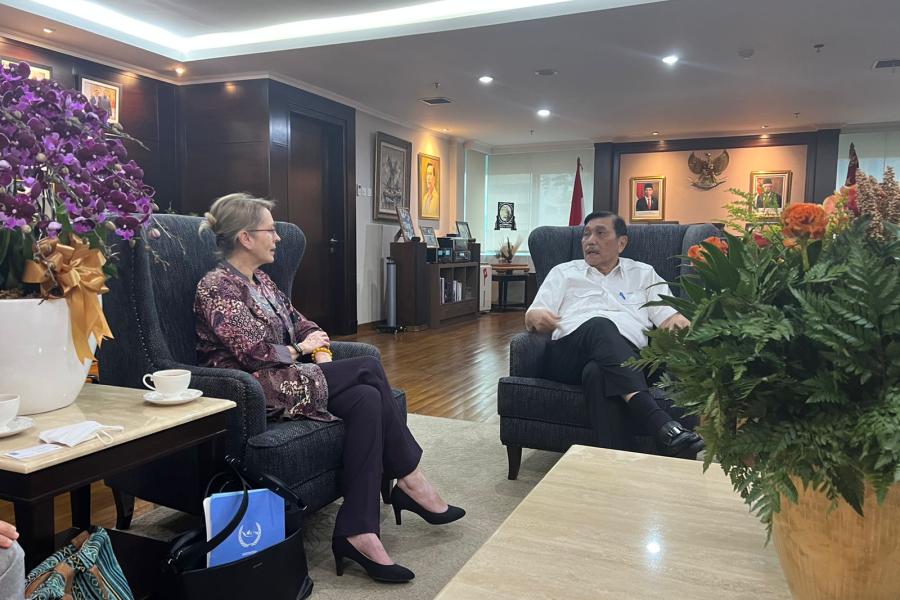Changing Currents for Ocean Sustainability
29 September 2022
Jakarta, 29 September 2022 –
The United Nations (UN) and the Government of Indonesia will work closely together and complement each other in designing and implementing programs to protect and sustainably develop the oceans. Coordinating Minister for Maritime Affairs and Investment, Luhut Binsar Pandjiatan, and UN Resident Representative in Indonesia, Valerie Julliand, today discussed concrete implementation steps under the National Blue Agenda Actions Partnership, which will be launched on the sidelines of the G20 Summit in Bali in November.
Indonesia, the world's center of marine biodiversity, is changing the course of sustainable ocean use with the support of the UN and other development partners, Luhut said.
"Indonesia is committed to supporting the fulfillment of the National Blue Agenda Action Partnership," he said, adding that the Partnership will help Indonesia achieve its national medium-term plan targets. Indonesia has committed to a healthy and sustainable ocean. I believe we can recover together and recover stronger on a sustainable blue path.
The Partnership will focus on the marine and maritime sector, ensuring a healthy environment and contributing to prosperity under four pillars: Blue Health, Blue Food, Blue Innovation and Blue Finance.
Valerie Julliand, said "Protecting the oceans, and their resilience, is important not only for food security and economic growth, but also in the fight against climate change. This is a good example of why development goals cannot be addressed in isolation, but holistically across sectors. And that is what we are doing in Indonesia."

Healthy and resilient ocean and coastal ecosystems are fundamental to sustainable development. They are sources of food, energy and minerals, enable the transportation of goods around the world and regulate our climate. However, coastal and marine ecosystems in Indonesia are beginning to show signs of degradation from infrastructure development, extractive industries and pollution that threaten the lives of many ocean-dependent communities.
In a workshop organized by the UN team and CMMAI/Mo Marves and other relevant ministries earlier this week, speakers reviewed various initiatives both ongoing and newly planned, from paying fishermen to collect plastic waste at sea to diversifying employment opportunities for coastal communities in sectors such as tourism, and more. Speakers also discussed ways to organize blue finance to balance food production and environmental conservation.
The partnership is based on complementarity between international and national efforts, ensuring higher overall impact. Involving several UN agencies in Indonesia (FAO, ILO, UNDP, UNEP, UNESCO, UNIDO, UNOPS and UNWOMEN), working closely with relevant government ministries and agencies as well as the international development community in supporting Indonesia's role as a global leader in the field of a sustainable Blue Agenda.
As Chair of the G20 Presidency, Indonesia initiated Ocean 20 and promoted - in line with the Sustainable Development Goals - three key issues on 'life on land, and under water': supporting stronger sustainable recovery, promoting effective management of terrestrial and marine ecosystems and resource mobilization to support climate change mitigation and adaptation.
Valerie Julliand adds: "This Blue Partnership, including the Action Plan, comes at an opportune time, as the world looks to Indonesia during this year of the G20 presidency. As the world's largest archipelago, Indonesia can set an example for other countries in ocean-based sustainable development."
***
About the UN in Indonesia:
The United Nations (UN) is an international organization founded in 1945. It currently consists of 193 Member States. The mission and work of the United Nations is guided by the purposes and principles contained in its founding Charter. In Indonesia, the UN is committed to supporting the Government of Indonesia in achieving the Sustainable Development Goals (SDGs) by 2030. The UN Country Team is led by the Resident Coordinator (RC) of the UN Chief of Mission, the representative of the UN Secretary General at the country level. The RC leads the UN Country Team in consultation with the Government to define and agree on the UN's strategic response to the Government's development priorities in implementing the 2030 Agenda.
About the National Blue Agenda Partnership:
There are four main pillars of the Partnership:
- Blue Health: (blue biodiversity and conservation, restoration, ecosystem management, coastal spatial planning, )
- Blue Food (production, consumption, marine and aquaculture, market penetration and access to supply chains, food security systems, small-scale producers, sustainability certification and product competitiveness, innovation and investment angles)
- Blue Innovation (science, technology, applications, human development, capacity building, employment, livelihoods, e-applications)
- Blue Finance: (creative financing, payment for ecosystem services, blue economy, blue bonds, blue Sukuk, incubation/start-ups).
Contact:
- Miklos Gaspar, Director of the UN Information Center in Jakarta (UNIC): miklos.gaspar AT un.org
- Andreas A. Hutahaean, Coordinating Ministry for Maritime Affairs and Investment (Kemenko Marves): andreashut@maritim.go.id







